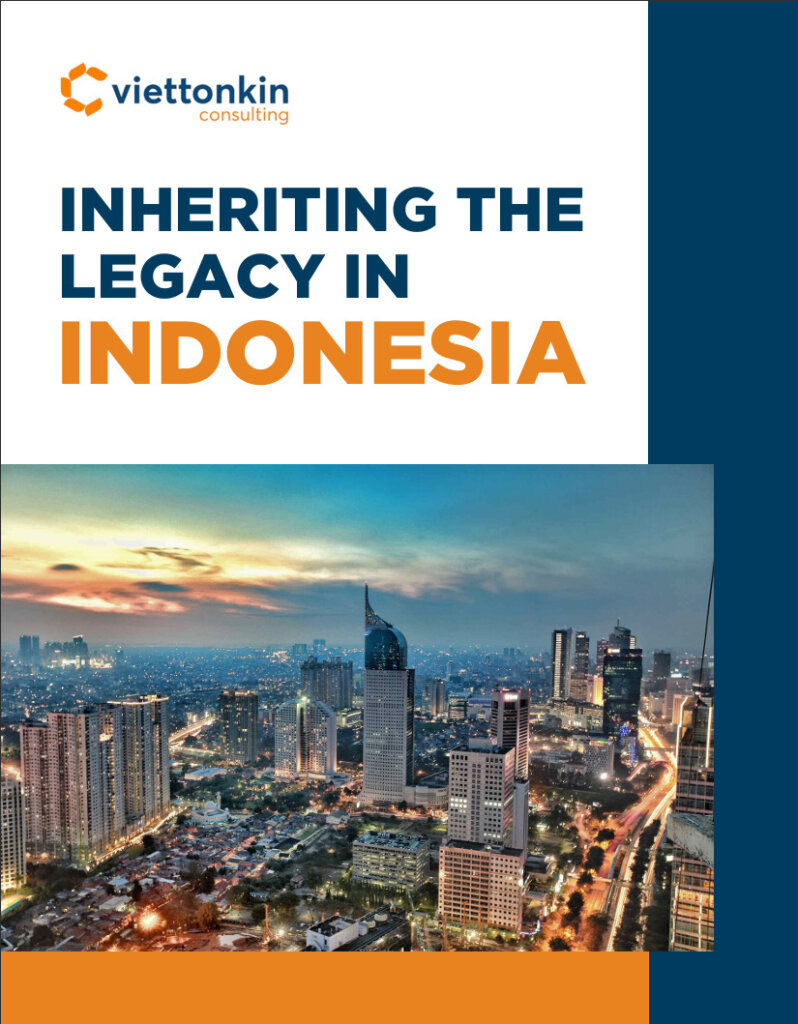In Vietnam, the specifics of offer and acceptance can determine whether you have a legally binding contract at all. The process of contract formation is governed by strict rules, and a simple oversight can mean that the parties never created the legal relations they intended. For any business operating here, understanding when an agreement becomes […]
Hiring foreign talent in Indonesia can be a bureaucratic nightmare. For international companies, juggling shifting regulations, work permit quotas and compliance risks is a major headache for HR and legal teams. How do you get the critical skills you need to grow without getting bogged down in red tape? Hiring foreign hires in Indonesia also requires navigating complex regulatory requirements, compliance obligations and documentation processes to ensure full legal compliance.
With over two decades of experience guiding businesses through FDI challenges across ASEAN, I’ve learned one thing for sure: hiring foreign talent is not just an HR task – it’s a strategic move to support business expansion in Indonesia’s growing market.
Business expansion is often the driver for seeking foreign talent as companies look to increase competitiveness and access new opportunities. This guide simplifies every step, from initial planning to final onboarding, grounded in the real-world needs of businesses expanding in the region. Let’s unlock your growth.
Key Takeaways:
- Strategy First: Hiring foreigners in Indonesia requires a strategy that aligns with local regulations and your business goals, not just a reactive search for talent.
- RPTKA is Mandatory: The Foreign Worker Utilization Plan (RPTKA) is the first approval you need to get from the Ministry of Manpower before anything else can happen.
- It’s a Multi-Step Process: Getting a foreigner to work involves a series of approvals from RPTKA to IMTA to KITAS.
- Compliance is Non-Negotiable: Employers have strict obligations including paying into the Skill Development Fund (DKP-TKA) and reporting all changes to the Ministry of Manpower. There are also strict rules that prohibit foreign employees from occupying certain positions such as HR as per official regulations.
- Budget and Timelines are Key: A realistic understanding of the costs and timelines is crucial for workforce planning and avoiding operational delays.

Why Hiring Foreign Talent in Indonesia Requires a Strategic Approach
Bringing in foreign expertise into Indonesia is a balancing act. While the government wants to attract investment, it also protects local employment. As more foreign companies enter Indonesia’s market, strategic planning becomes even more important to ensure compliance and competitiveness.
Bridging the Skills Gap: Sectors like technology, oil and gas and specialized manufacturing often have a high demand for foreign experts with skills not yet available locally. In the business sector, foreign professionals play a key role in driving innovation, supporting complex projects and knowledge transfer. For foreign investors, bringing in seasoned talent is often crucial for knowledge transfer and getting a new operation up and running.
- Balancing Business Need with Legal Compliance: Your business may need a specific expert but Indonesian regulations require you to justify why a local candidate can’t fill the role. So your hiring plan must be built on a solid business case. Aligning your workforce needs with the RPTKA approval process from the very beginning is the game-changer that prevents costly rejections and delays. For HR teams this means working hand-in-glove with the business development side to create a compliant and defensible hiring strategy. Hiring foreign talent not only supports business growth but also job creation and overall development of Indonesia’s workforce.
The Legal Framework for Foreign Nationals
To hire with confidence you must understand the key components of the legal framework which is governed by Indonesia’s manpower law and related manpower regulation. These laws regulate the employment of foreign nationals and set out the requirements for legal entities and business entities to hire foreign employees and employ foreign workers in Indonesia. Think of it as a three-part system: the plan, the permit and the obligations.
- RPTKA (Rencana Penggunaan Tenaga Kerja Asing): The Plan
This is the Foreign Worker Utilization Plan and it’s the mandatory first step. It’s essentially your company’s formal application to the Ministry of Manpower, detailing the positions you intend to fill with foreign nationals and your plan to transfer skills to local counterparts. The RPTKA process is governed by implementing regulations and implementing regulation such as GR 34/2021 which clarifies the procedures and requirements for companies that wish to hire foreign workers and hire foreign employees. Companies must comply with government regulation and manpower regulation when hiring foreign employees. Certain emergency or short-term roles may be exempt but for most long-term hires the RPTKA is non-negotiable. - KITAS (Kartu Izin Tinggal Terbatas): The Stay Permit
Once your RPTKA is approved the foreign employee can obtain the necessary work visa such as limited stay visa (VITAS) and upon arrival in Indonesia convert it into a Limited Stay Permit (KITAS). The KITAS is sponsored by your company (the sponsor company) and is tied to the specific role and location approved in the RPTKA. Obtaining a KITAS is essential for establishing legal residency for foreign employees in Indonesia. The process for obtaining stay permits includes the conversion from limited stay visa to KITAS and may eventually lead to a permanent stay permit (KITAP) for eligible foreign employees. There are various types of work permits, work visas, limited stay visa vitas, temporary work visa and permanent stay permit options available for foreign employees depending on the nature and duration of their employment. - Employer’s Obligations
Your responsibilities don’t end once the permits are issued. Employers must comply with all relevant labour laws and employment laws in Indonesia. Employers must: - Pay the DKP-TKA: This is a levy paid to the Skill Development Fund, typically USD 100 per month per foreign employee, contributing to the training of the local workforce.
- Report to the Ministry of Manpower: You must officially report the employee's work commencement through the Ministry's online system.
- Manage Changes: Any change in job title, location or an employment termination must be officially reported and may require a new permit application. Ensure employment contracts match the approved job title and use the correct type of employment contracts for foreign employees, such as PKWT (fixed-term) or PKWTT (permanent) in accordance with implementing regulations.
Only certain legal entities and business entities are allowed to hire foreign employees and employ foreign workers in Indonesia. These include foreign private companies, government agencies, cultural institutions, foreign news agencies, representative offices and other business entities such as social, religious, educational and impresario organizations.
The Head of a Representative Office may be subject to specific exemptions under employment laws. Companies must also maintain a certain ratio of local employees to foreign employees as required by manpower law.During the visa application process foreign employees must register their home country details and provide all required documentation for the foreign worker’s employment.
Foreign nationals who meet the eligibility criteria can work in Indonesia provided all legal requirements are met. Foreign employees can also start their own business or work in special economic zones which offer specific benefits for foreign professionals. Sectors such as waste management often require foreign expertise and are included among the areas where foreign employees are commonly hired.
Employers in Indonesia must comply with all relevant manpower law, labour laws and employment laws to legally hire foreign workers and employees in Indonesia.
Crafting Your Foreign Worker Utilization Plan
A well-crafted Foreign Worker Utilization Plan (RPTKA) is the foundation of a successful strategy for hiring foreign workers in Indonesia. This document is more than a bureaucratic formality – it’s your company’s opportunity to align business needs with regulatory expectations and demonstrate your commitment to developing the local workforce.
When preparing your RPTKA start by clearly defining the position you intend to fill with a foreign worker. Outline the job description, required qualifications and the specific employment duration. Be precise: Indonesian labour laws require that every detail matches the actual role and responsibilities the foreign worker will undertake.
Crucially your RPTKA must include a robust plan for knowledge transfer and job training for local workers. This means specifying how your foreign employee will share expertise, mentor local staff and contribute to upskilling the local workforce. Whether through formal training sessions, on-the-job coaching or structured handover programs your plan should show a clear pathway for local talent to eventually fill the role.
Best practices for a strong RPTKA include:
- Aligning the foreign worker’s qualifications with the company’s operational needs and the skills gap in the local workforce.
- Detailing a timeline and measurable outcomes for knowledge transfer and job training.
- Demonstrating how the employment of foreign workers will support business growth while complying with Indonesian labour laws.
By submitting a comprehensive and thoughtful RPTKA you not only increase your chances of approval but also set the stage for a smooth hiring process and sustainable talent development within your organization.
The Step-by-Step Process to Hire Foreigners in Indonesia
Let’s break this down into an actionable, three-phase playbook.
Phase 1: Assess Eligibility and Role Requirements
- Identify the roles you need to fill and check if they are open to foreign workers. Note that certain positions, especially those in human resources, are restricted for foreign hires under Indonesian regulations.
- Review the qualifications and experience required for the position. Ensure you understand the documentation and compliance requirements for foreign hires, including necessary permits and legal paperwork.
- Confirm that the candidate’s background aligns with the job description and Indonesian employment laws.
Phase 2: Apply and Approve
- Apply for the work permits and visas.
- Coordinate with relevant government agencies to ensure all legal requirements are met.
- Prepare employment contracts that comply with local labour laws.
Phase 3: Onboard and Comply
- Complete the onboarding process, including orientation and training.
- Set up payroll and tax arrangements according to Indonesian regulations.
- Monitor and manage the foreign worker’s documentation and permit status to ensure ongoing compliance.
Phase 1: Preparation
- Eligible Roles: Review the government’s list of positions open to foreigners and ensure your intended role is not restricted (e.g., HR positions are generally closed).
- Draft and Submit RPTKA: Prepare a comprehensive application detailing the job description, required qualifications and your company’s justification for hiring a foreigner.
- Local Liaison: Appoint an internal HR staff member or an authorized external consultant to manage communications with the Ministry.
Phase 2: Permit and Visa
- RPTKA Approval & Notification: Once the RPTKA is approved the Ministry issues a Notification which replaces the former work permit (IMTA). This document is the basis for the visa application.
- Visa and KITAS Conversion: The foreign employee uses the Notification to apply for a visa at an Indonesian embassy abroad. Upon entering Indonesia this is converted into the KITAS.
- MERP: To allow the employee to travel in and out of the country without voiding their permit you should immediately apply for a Multiple Exit Re-entry Permit (MERP).
Phase 3: Post-Approval
- BPJS: Register the foreign employee in Indonesia’s mandatory social security (BPJS Ketenagakerjaan) and health insurance (BPJS Kesehatan) programs
- Tax ID (NPWP): Register the employee with the tax office to get their personal tax identification number (NPWP).
- Work Commencement: Report the employee’s start date to the Ministry of Manpower.
Mandatory Training and Knowledge Transfer

Mandatory training and knowledge transfer are not just regulatory checkboxes, they are strategic imperatives for any company employing foreign workers in Indonesia.
The Indonesian government requires that every foreign worker utilization plan includes concrete measures for transferring skills and expertise to local workers, so the benefits of foreign talent extend beyond the individual hire.
For Indonesia employers this means designing and implementing training programs that are tailored to the needs of your local workforce and aligned with your business objectives. These can be structured job training, mentorship, shadowing or formal vocational training sessions. The goal is to equip local employees with the skills and experience to eventually assume the roles currently held by foreign workers.
Knowledge transfer is a win-win: it reduces long-term reliance on foreign talent, supports compliance with Indonesian labour laws and builds a more resilient and capable local workforce. Companies that prioritise these initiatives often find they not only meet government regulation but also unlock new opportunities for innovation and growth.
The Indonesian government also recognises the value of effective knowledge transfer and may offer incentives to companies that demonstrate a strong commitment to local workforce development. By embedding training and knowledge transfer into your foreign worker utilization plan you position your business as a responsible employer and a partner in Indonesia’s economic growth.
In summary, making training and knowledge transfer a core part of your hiring process for foreign workers is essential, not just for compliance but for building a sustainable, future-ready team in Indonesia.
Common Compliance Issues And How to Fix Them
Even experienced companies can get caught in compliance traps. Here’s what to watch out for:
- First-Time Employers: The most common mistakes are basic. Incomplete or mismatched RPTKA documents are the number one cause of rejection. Another frequent error is having a job title on the employment contract that doesn’t exactly match the one approved on the KITAS. This can cause big problems during an audit.
- For Experienced Firms: Deeper traps often involve execution. For example having an employee work primarily in a location that is not the one specified on their permit is a serious violation. Improper sequencing of permit renewals can also cause gaps in legal status. A strategic insight I often share with clients is to ensure the salary structure in internal payroll is fully aligned with the policies and commitments made during the RPTKA process.
Infographic: The Foreign Hiring Process
RPTKA Submission -> Approval -> Visa Application -> Entry to Indonesia -> KITAS Conversion -> BPJS/NPWP Registration -> Official Work Start.
Table: Document Checklist by Role Type
| Requirement | C-Level Executive (Director) | Technical Specialist |
| Key Documents | University Degree, CV, Company's Legal Docs | Professional Certifications, University Degree, CV |
| Sponsor Type | PT PMA (Your Company) | PT PMA (Your Company) |
| DKP-TKA Levy | USD 1,200 per year | USD 1,200 per year |
| Typical Timeline | 2-3 months | 2-3 months |
Conclusion: From Compliant Hiring to Strategic Growth
Hiring foreign talent in Indonesia is possible, with the right plan. The difference between a smooth onboarding and months of delays comes down to strategic preparation, flawless paperwork and understanding the process. This is not just about filling a position; it’s about investing in the talent that will drive your growth in one of ASEAN’s most exciting markets.
My team at Viettonkin Consulting helps businesses across the region with employment law, tax and HR compliance for seamless cross-border expansion. Partner with us to turn regulatory challenges into strategic wins. The only way forward is with confidence.
You might also like: Employment Laws Indonesia: Your Guide to Protect and Grow Your Business










